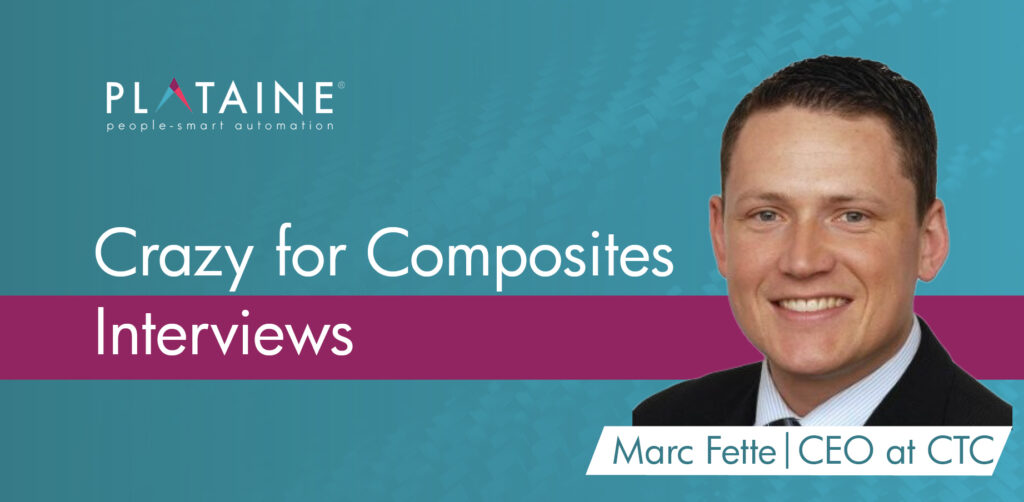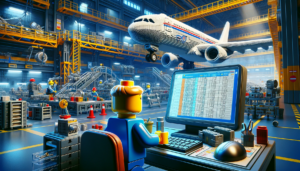Please tell us a bit about yourself
(name, job, hobbies, what do you do at work)
My name is Marc Fette, and I’m the CEO of CTC, which stands for Composite Technology Center. We are a 100% subsidiary of Airbus and acting as a Lightweight Technology and Innovation Center in Germany, Stade. We have some shared office space with our Airbus colleagues in the ECOMAT in Bremen, and the ZAL Tech Center in Hamburg.
And on a personal level.
One of my hobbies is also a profession, because I’m a leading researcher at Helmut Schmidt University. That’s the University of Armed Forces of Germany, Hamburg. I’m leading a research team, which is related to additive manufacturing and automated lightweight technologies at the Institute of Production Engineering. I have some honorary roles, like the chairman of the VDI association of German engineers, one of the biggest engineering and scientific associations in Europe. It has 140,000 members and my responsibility as the Chairman of the Technical Division Aerospace of the VDI Association of German Engineers, one of the biggest engineering and scientific associations in Europe with about 140,000 members . Yet for all the aerospace stuff, we have forces society: from standardization
to seeing enablement of young talents. I’m also Chairman of the Board of the Northern Cluster of the Composite United, which is the former CFK Valley association.
It’s important for me to support young talents on their way, but also the knowledge transfer and this is one part of our DNA at CTC – to have this transfer from the research area to serial production, applications, and back, not only one way. It should be a closed loop, to have the right knowledge and the right input for new research, this is important. The other thing is that we also need this networking and this knowledge transfer cross sectoral because the major challenges are not specific to one industry as the digital change, for example, but all that’s related to sustainability, to the increase of equal efficiency and to climate change. We need holistic solutions which are not related to just one branch like the aviation industry, since a lot of solutions can be directly transferred to other mobility sectors. It’s very important to have a closer knowledge transfer to share solutions. We need to come up with industry challenges and that’s more important for the research than it was before. In addition, it’s also important to have such networks, such associations, because they have this cross link from research to industry, but also across different mobility industries or different branches and sectors in total.
Maybe in some words about my hobbies, because I not only work. I have a family and I love traveling. I had the honor of visiting various countries on 6 continents and I will extend it a little bit more because I’m so interested in other cultures. This experience is very important because we are working in an international environment.
The thing you love the most about CTC and your department.
When focusing on CTC, we have now about 100 customers and partners worldwide because we are not only acting for Airbus; we are allowed to act outside Airbus with all kinds of mobility industries or everywhere where holistic lightweight solutions and technologies are needed, just not with Airbus competitors. The percentage now is 40% outside Airbus business and 60% Airbus related business. It’s cross division and not only commercial aviation. In most of our worldwide sectors where we are active, there is an international environment and it could link to my hobbies, that’s why covering other cultures is important to me. It’s also important for the company because you need this cultural acceptance, these intercultural competencies, try to understand what other cultures mean and what’s important, and what you must take into consideration. To have good and sustainable relationships is also a basis for business, not only for friendship. Coming together is good for the social environment.
What is your top challenge at CTC?
For us, the most important thing is our DNA, and to always discover an interdisciplinary team that can act in a creative way to bring innovations to serial applications. For example, to have right people, an excellent team, the right partnerships, the right working environment, to be agile, and to have lean processes within the company, and with our partners.
We are building integrated and interdisciplinary teams, and I guess that’s the key. To maintain and develop it further on, that’s the most important aspect for us, and sometimes the challenge.
Today we have an increasing number of non-existing experts and also have the challenge to find the right talents for new job profiles, and in total, to have workers. That’s an issue today and this issue will be increased by this demographic change during the coming years.
At the end, coming up with a digital change requires taking people with us and the same with the sustainability for the aviation industry – it is the most important thing that there will be an acceptance, so we could connect people. That’s the real purpose for me, for aviation – connecting people, and bringing cultures together where no other mobility system can manage it.
To sustain this, to maintain this, and develop it further on, we need solutions which are built holistically not only for the product, but over the production system and the total value chain, including the supply chain.
What is your best tip for digital transformation?
I guess digital transformation starts with more automation, with more industrial processes, and then digitization is one important framework. To have a completely digitized process where the data, machines, and the infrastructure are connected. When we look end to end maybe we also have this connection between research, engineering, production, and the operational life of a product. Then, it’s one of the only chances we have during the next years: to speed up our implementation of good solutions and to manage this demographic change.
Nevertheless, we must involve all the people, because it’s not a technical issue. At the end, we have people and it’s all about people. When it comes to a more digital world, we need these people – they have other abilities, they have other skills. We must build it, but we also have people which are not so aware about the automated solutions and the task is to take to convince them, and to have their acceptance. That is a part of this change, and this is the biggest challenge. It’s not the technical solution itself, I guess.
When we take all these things which exist with state-of-the-art technology, we will need a view of years to implement these solutions in the industry. We need to convince the people and to focus on them when we are making these changes of processes in organizations.
Is sustainability (recycling) being something you deal with now? Part of the company agenda?
Sustainability has been one of our six strategic pillars for the last decade at CTC. It’s a relevant topic for us and exists in our management system at CTC. Ecological sustainability plays an important role in these 15 years we are developing technologies which start with the reuse and recycle of carbon fibers. Then we also start to have the first capabilities to make life cycle assessments.
Sustainability is a also very important for us as in terms of social and economic sustainability. Also, sustainability is important for us when it comes to partnerships and networks; when it comes to customer satisfaction – it’s really important to have not only quick wins, but to have a really sustainable relationship. And yet for most people when they talk about sustainability, mention ecological sustainability.
That’s important to us because for current and future development, because ecological sustainability should be a part in each step of the value chain for the product, to the production system from the raw materials, along the entire value chain. At the end, for over 21 years at CTC, we are shaping and driving ecological sustainability because lightweighting is one of the most important contributions to eco efficient and sustainable mobility.
Because less mass means less energy consumption and often less emissions. It is also important, not only changing a propulsion system and an energy source. These are important pillars, but also lightweighting is a really important factor, because in order to take limited resources and less energy consumption into consideration.
On a more personal note, if you weren’t the CEO of Composite Technology Center, what would you be doing?
I love what I do, I’m inspired and passionate about what I do. I guess I would be in the aerospace industry and trying to manage innovation for all the challenges we have. I’m really passionate about aerospace and with the great contribution of CTC, my entire team and lightweight technologies; you can see the value of your work.
With the combination of being both a researcher, manager, strategist, and being in these networks, that for me is the best combination and it fulfills my professional needs completely.
All my needs are fulfilled because it’s really important to me. When you’re interested in something, when your intrinsic mode is motivated, you can achieve everything and you can also motivate the people around you, and that’s crucial. When you are alone, you cannot change the world. It’s always a team effort, and when you are inspired and passionate, you can also transfer it to your environment and that’s really important to me.
on the latest interviews





